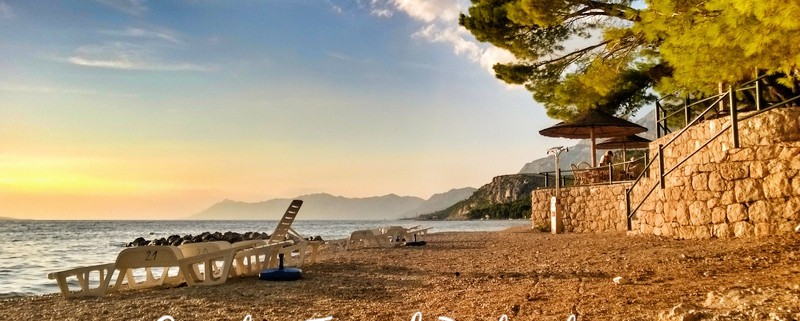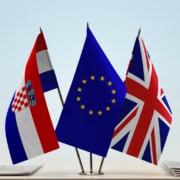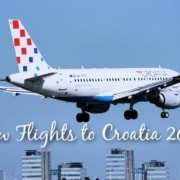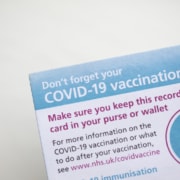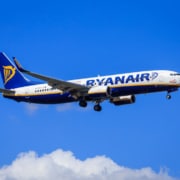Croatia Travel Restrictions 2021
If you’re planning on visiting the country in the next few months, there are certain Croatia travel restrictions that apply with regards to coronavirus – both for entering the country and regulations in place when here. We’ll take a look at how these will affect travellers and what you need to know!
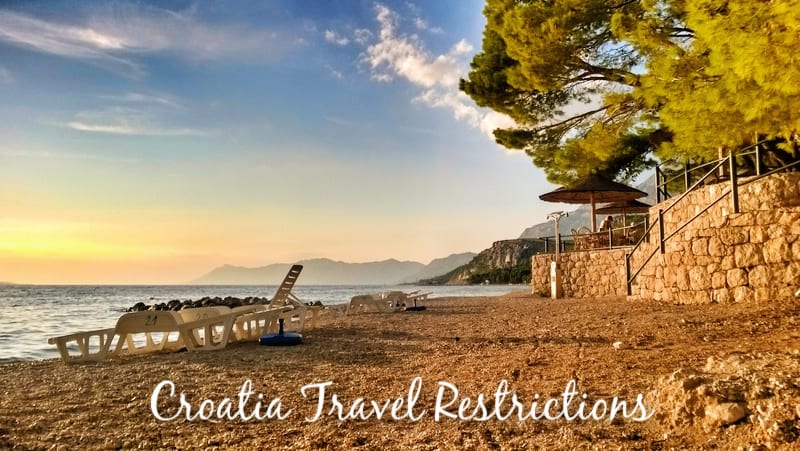
Croatia Travel Restrictions 2021 – Entering Croatia
Croatia is open to tourists and welcomes them. (Normal visa restrictions apply, of course.)
NEW Visiting Croatia as a traveller from the UK, Cyprus, Russia or India
In effect from 26th July, ALL travellers (even if they are double-vaccinated) from these four countries must present proof of a negative PCR test taken in the previous 72 hours before entry into Croatia, or a negative rapid antigen test taken in the previous 48 hours before entry.
LATEST UPDATE As of 1st October 2021, a negative test is no longer required for fully vaccinated travellers from the UK, Cyprus, Russia or India. Please see the latest news: Double vaccinated UK travellers to Croatia no longer need a negative test.
Visiting Croatia as a non-EU national/resident
If you are a non-EU national and travelling to Croatia from outside of the EU, in order to enter the country you must have one of the following:
- a negative PCR test undertaken in the previous 72 hours or a rapid antigen test undertaken in the previous 48 hours (at the point of entry); if you are using a rapid antigen test, it must be one recognised by the EU, and the test name and manufacturer must be visible, and the test must be conducted by a healthcare facility/laboratory and signed or confirmed by a doctor
- a vaccination certificate not older than 365 days showing you have received two doses of a vaccine more than 14 days before entry into Croatia (or a vaccination certificate not older than 365 days showing you have received a single dose – in the case of single-dose vaccines – more than 14 days before entry into Croatia)
- a certificate showing you have recovered from covid AND you have had one dose of a covid vaccine in the eight months since recovering; your vaccine dose must have been administered in the previous 12 months before arrival in Croatia
- a certificate showing you have previously been infected with covid and had a positive PCR or rapid antigen test result in the previous 270 days only (and valid from the 11th day after your positive test result)
- if you don’t have one of the above, you must obtain a PCR or rapid antigen test immediately after arriving in Croatia (at your own expense) and to isolate until you obtain a negative test result – if do not do this, you must isolate for a full 10 days
According to the Ministry of the Interior, non-EU/third-country nationals (which UK citizens now are!) can visit if you are:
- travelling for tourist reasons and have a certificate of paid accommodation in a hotel, camp, private renter or rented vessel and other forms of tourist accommodation
- HOWEVER, please note that this requirement now no longer exists for travellers from the following countries: Albania, Armenia, Australia, Azerbaijan, Bosnia & Heregovina, Brunei, Canada, China, Hong Kong, Israel, Japan, Jordan, Kosovo, Lebanon, Macao, Montenegro, Moldova, New Zealand, North Macedonia, Qatar, Saudia Arabia, Serbia, Singapore, South Korea, Taiwan, Ukraine, USA
Travelling to Croatia from the EU
If you are travelling to Croatia from the EU – as an EU citizen or otherwise – as of 1st July you can enter Croatia with an EU Digital Covid Certificate.
If you do not have one yet, you must present one of the following at the border:
- a negative PCR test undertaken in the previous 72 hours or a rapid antigen test undertaken in the previous 48 hours (at the point of entry); if you are using a rapid antigen test, it must be one recognised by the EU, and the test name and manufacturer must be visible, and the test must be conducted by a healthcare facility/laboratory and signed or confirmed by a doctor
- a vaccination certificate not older than 365 days showing you have received both doses of a vaccine in use in the EU (Pfizer, Moderna, AstaZeneca, Gamaleya, Sinopharm) or a vaccination certificate not older than 365 days showing you have received a single dose (Janssen/Johnson&Johnson) – in the case of single-dose vaccines – and 14 days has passed since that single dose
- a vaccination certificate showing you have received the first dose of the Pfizer, Moderna or Gamaleya vaccine, on the basis of which you can enter Croatia in the period of 22 to 42 days from receiving the vaccine, or 22 to 84 days from receiving the first dose of the AstraZeneca vaccine
- a certificate showing you have recovered from covid AND you have had one dose of a covid vaccine in the eight months since recovering; your vaccine dose must have been administered in the previous 12 months before arrival in Croatia
- a certificate showing you have previously been infected with covid and had a positive PCR or rapid antigen test result in the previous 365 days only (and valid from the 11th day after your positive test result)
If you don’t have one of the above, again:
- you must obtain a PCR or rapid antigen test immediately after arriving in Croatia (at your own expense) and to isolate until you obtain a negative test result – if do not do this, you must isolate for a full 10 days
Children Travelling to Croatia
Children under the age of 12 who are travelling accompanied by a parent or guardian are exempt from having to provide a negative test result (or to self-isolate) providing their parent or guardian adheres to the above entry regulations.
Negative test requirement for all travellers from Brazil
As of 1st October, travellers from Brazil no longer need to quarantine for 14 days upon arrival in Croatia. However, ALL travellers – regardless of vaccination status – from Brazil need to show a negative PCR test (taken in the previous 72 hours) or a negative rapid antigen test (taken in the previous 48 hours) to enter Croatia.
14-day self-isolation requirement for some countries
Travellers from South Africa and Zanzibar (Tanzania) must show proof of a negative PCR test undertaken in the previous 48 hours AND must also isolate for 14 days upon arrival in Croatia. (The isolation period can be shortened if a PCR test – at your own expense – is taken on day 7 at an authorised testing facility.)
Enter Croatia
It is highly recommended that you fill out the online form on the Enter Croatia website in order to speed up your entry into the country.
To recap – Croatia travel restrictions: what you need to know
If you are travelling to Croatia from the EU/EEA, you can enter with:
- an EU Digital Covid Certificate
- OR – if you do not have one yet – then a negative PCR or rapid antigen test; OR a certificate showing both doses of a covid vaccine; OR a certificate showing you have had covid AND have had one vaccine dose in the six months since recovering; OR proof of having had covid in the past 180 days
If you are travelling from outside the EU/EEA, you must have:
- a negative PCR or rapid antigen test; OR a certificate showing both doses of a covid vaccine; OR proof of having had covid in the past 180 days
- AND proof of a paid accommodation booking UNLESS you are travelling from certain countries as mentioned above
Croatia Travel Restrictions 2021 – In Croatia
Latest Update Please see our Coronavirus in Croatia Autumn 2021 Update for the latest rules in the country.
As of 28th May 2021, covid-related restrictions in Croatia are to be relaxed somewhat. These new measures mean that:
- As of 1st September 2021, cafes are permitted to serve guests indoors as well as on their outdoor terraces
- Public gatherings are now limited to 50 people aside from gatherings of up to 1,000 people where all participants must show proof of vaccination/negative test/recovery from covid
- Cafes (and bakeries, and similar catering facilities) are now allowed to serve customers until midnight, although only outdoors
- Public gatherings can now run until midnight
- Restaurants and catering facilities will now be able to serve customers in indoor spaces. Cafes and pubs will also be able to serve customers indoors, providing they have facilities for serving food
- Catering establishments can work from 6am to 11pm
- The limit on passenger numbers on public transport (previously only 40% of capacity allowed) has been lifted
- Alcohol can be sold from 6am to 11pm
- Casinos are permitted to open from 8am to 11pm
- Bakeries are allowed to operate until 11pm
- Indoor playrooms are permitted to open
- The limit of 100 people at private gatherings has been lifted
- Public gatherings can run until 11pm
- Weddings can have 120 guests, although guests must either have had both doses of the vaccine, have previously had covid or tested negative for covid in the previous 48 hours
- Funerals will no longer have a restriction on the number of people attending
Masks must still be worn in public (and indoors) in situations where social distancing cannot be maintained.
Visiting Croatia in Summer 2021
Now that you’ve got up to speed on Croatia travel restrictions, take a look at our Visiting Croatia in Summer 2021 section for plenty of helpful travel advice and tips.

